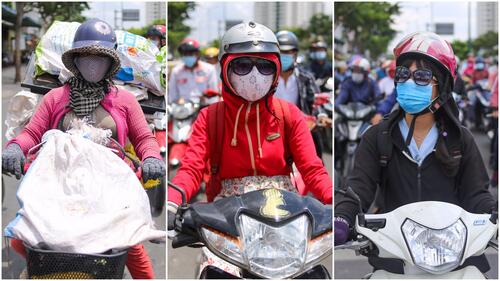“Ninja Lead”: The Face of Vietnam’s Motorbike Culture and the Battle of Sexism

“Ninja Lead”: The Face of Vietnam's Motorbike Culture and the Battle of Sexism
In tropical Vietnam where the heat is always burning, it is easy to spot women who fully cover themselves from head to wrist with sun-protective masks, shirts, and skirts riding scooters on the street. The trend first started with a simple face mask to prevent sun exposure and heavy air pollution. To accommodate Vietnamese’ obsession for sun protection, the gear expanded to include a protective jacket to cover the arms and long protective skirts to cover the legs. Today, the full suit consisting of sunglasses and complete coverage, typically available in floral patterns, ensures all parts of the body are shielded from the sun’s rays.
The increased popularity of these ninja outfits can be traced back to the long-standing female obsession for light skin. Due to Vietnam’s agricultural roots, where the poor were usually tanned workers working under the sun in the rice field, light skin tones have long been a standard for beauty and high social status. This obsession for pale skin is even more amplified today, from remnants of Western colonization to recent East Asian cultural waves.
Although full coverage in these outfits inarguably helps women to maintain a paler skin tone, it has raised concerns that these outfits hamper their ability to see their surroundings. There is no official statistics that proves people wear sun-protective gear cause more accidents. However, based on the images and videos widely distributed on Vietnamese social media, these female motorbikers have the reputation of reckless driving. The online community has dubbed them with the ironic visual phrase “Ninja Lead”, as the Lead motorbike seems to be the most popular vehicle among women. In my opinion, this term may be an incorrect generalization as not all women who wear these outfits lack traffic awareness or not all people who drive the Lead motorbike cause accidents. Yet the image of a faceless woman has become an easy online scapegoat for people to express their anger about bad driving and overlook reckless men as they do not fit in this description.
While the image of “Ninja Lead” has quickly become a street icon in Vietnam, it reinforces the inferior role of Vietnamese women in society where their mistakes are more vulnerable to criticism. In the long term, the jokes and memes on social media about female scooters will make it harder to reduce gender prejudices and may lead to more severe consequences, including continued tolerance for domestic violence.
Sources:
Nhung Nguyen. “‘Street ninjas’ battle sexism and the sun in Vietnam.” VnExpress, 8 October 2017.
Josee Ng. “Louis Vuitton releases outfit resembling Vietnamese bikers’ protective gear, sparking hilarious netizen comments.” The Smart Local Vietnam, 4 September 2020.
Photo is from the VnExpress article and taken by Quynh Tran.
Comments
Cam,
I really appreciate how you move so effectively from a description of Vietnam’s hilarious meme culture to a more serious discussion of the scapegoating of women within Vietnam’s often dangerous traffic. In addition to this Ninja theme you describe, I remember a lot of memes and cartoons comparing Vietnamese women to Muslim women, but not in a favorable manner. The “joke” was doubly derogatory – not least to global Islam but also to the idea that women can dress how they like.
As the world becomes more and more aware of the dangerous effects prolongued exposure to the sun can have on skin, I wonder if the issue is not only about wishing to maintain light skin, but to be prudent about cancer risks. In addition, it’s not just sun–but the mud, dirt, exhaust of the road way is also something to protect against.
On a larger note, as an urbanist, I have long been interested in how the failures of urban planning in Vietnam are often blamed on motorbikes, when many of the issues are more likely related to real estate developers coopting the planning process.
Pages